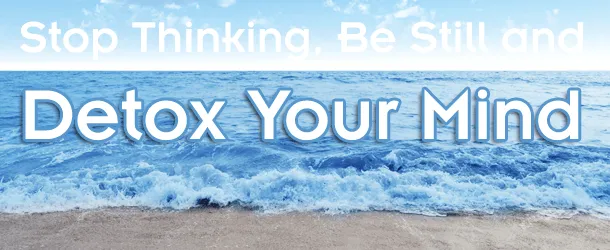I remember the first time I did a body detox. No sooner than you can say, “master cleanse” than I broke out with red spots that took more than a week go away. I’m convinced that it was my body getting rid of poisons, and it took a fast to push them to the surface. You’ve probably heard of treatments that clear your body of stuff it doesn’t need: Cleansing fasts, saunas, and massage therapy. These aim to help our bodies remove the negative effects of what we eat and drink and the air we breathe, and they promote healing. But what about our minds? Let’s explore the cleansing power of meditation.
Overthinking the Problem
We start thinking at a young age. And from there we think, think, and think some more. In fact, our minds are constantly running with thoughts. The formula is usually simple: Stimulus appears, and then we respond to it. We do this over and over, countless times a day. Outside of a good night’s sleep, we give our minds nearly no breaks.
———————-
Check Out Dr. Puff’s 1 Simple Trick to Slowing Your Mind Down
———————-
Even during passive undertakings—such as watching TV, listening to music, or reading a book—most of us will find that thoughts arise. We become so addicted to being constantly stimulated that when it’s finally time to fall asleep, our minds refuse to shut off.
In fact, thinking is one of the few activities that our bodies do without pause. For instance, we don’t eat or work all day. Imagine what would happen if we ate non-stop or if we worked without a break. We’d be either very overweight or collapse from exhaustion. So why don’t we give our minds a break?
When I was in college, I would study so hard that by the end of the day, my mind hurt. It wasn’t a headache. Rather, it was information overload. Thankfully, I discovered meditation. I found that if I could stop and be still that I would feel relaxed and peaceful.
Years later, I experienced an even deeper state of relaxation when I attended my first meditation retreat. I remember driving to the center, and I was listening to music. When the event started, I couldn’t get the song I was listening to out of my head. It stuck there for two days! On the third day, I was able to rid myself of the song and reach mental silence.
Fast forward to today, and I’m now the one hosting medtitation retreats. I love helping others find mental stillness. So many times, when we arrive at that still place, we start feeling things that we didn’t know were there. The experience isn’t always pleasant. In fact, the emotions can be overwhelming and even frightening. It’s not that the feelings weren’t there before. The reality is that they’ve always been there. We’ve just never stopped to allow them to surface. The good news is that the result of working through these emotions is that we heal ourselves.
What Veterans of War Teach Us About Stress
In my years of private practice, I’ve worked with many war veterans. When they come back from battle, they think they’re OK because the worst is behind them. But then they find themselves overwhelmed with traumas that they had to suppress for the sake survival. Often, their thoughts are so overwhelming that they’ll resort to pain killers like alcohol and drugs, which are full of terrible side effects.
Although those who fought in combat have experienced a particular type of mental trauma that most of us haven’t gone through, we can learn from what happens to them. We, like soldiers, need to regularly check-in and examine what is taking place in our minds and hearts. If we just keep going and going, we never give ourselves the time to figure things out. Meditation gives us an opportunity for self-examination. And a retreat setting gives us an extended time to slow down and search within.
I recommend that you go on an extended retreat at least once a year. When we’re still for five days or longer, we give our minds an extended vacation, which rejuvenates and heals us. Even if no pent-up issues arise during our week or more away, it’s still invaluable. If you can’t fit one in annually, then participate whenever you can—you won’t regret it.
Just as our bodies need rest, so do our minds. In fact, we should give our minds breaks throughout the day. Short periods of silence throughout the day are very important to our well beings. When we extend our silence even longer, through retreats, our minds benefit even more. So give yourself a mental vacation—you’ll find it one of the most transformational experiences you’ll ever have. If you’re in the Southern California area, I regularly host day-long retreats.To learn more, visit my website at http://www.holisticretreats.tv
– Dr. Robert Puff
Dr. Robert Puff, Ph.D. is a clinical psychologist, author, international speaker, and meditation expert who has been counseling individuals, families, nonprofits, and businesses for over twenty years. A contributing writer to Psychology Today, he has authored numerous books and creates a weekly podcast on happiness at http://www.HappinessPodcast.org He also creates a weekly podcast on meditation, http://www.MeditationForHealthPodcast.com and a weekly podcast on spiritual enlightenment, http://www.EnlightenmentPodcast.com
His retreat schedules can be found at http://www.HolisticRetreats.tv You also might find his blog useful at http://www.Meditation-Enlightenment.com
If you are interested in having Dr. Puff speak to your organization or company, you can learn more about his speaking services at http://www.SuccessBeyondYourImagination.com


